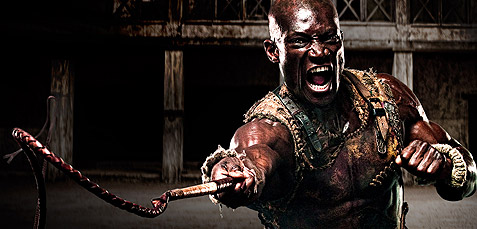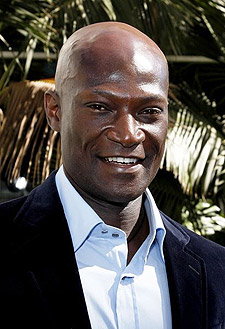
Interview Date: 01/07/2011
Run Date: 01/20/2011
Interviews Home / TV Home / Bullz-Eye Home
Peter Mensah was born in Ghana, grew up in England, and now lives in Canada. This tendency toward perpetual motion is one which is also evident with his work as an actor, which has taken him from Morocco to New Zealand, even into space…well, not really, but that’s where “Jason X” took place, so I’m saying it still counts. Our conversation during the Winter 2011 TCA Press Tour came about at the last second…like, literally, I walked out of my interview with John Hannah and was asked, “Hey, wanna talk to Peter Mensah?” As such, I apologize for the lack of hard-hitting questions, but at least you get a bit of insight into how he came into the “Spartacus” franchise, what he’s learned along the way, and how he thinks newcomers will still be able to step easily into the prequel series, “Spartacus: Gods of the Arena.”
Bullz-Eye: So since this is the first time you and I have ever chatted, how did you fall into the world of “Spartacus” in the first place?
Peter Mensah: Well, I was very fortunate. A couple of years ago, I got a call while I was traveling up north in Canada from a friend of mine who’s a writer on the show, saying that they’re doing this project and there’s a role that would be perfect for me if I’m interested. So the project found me, I guess, effectively. It was brilliant: they knew the body of work, and they were interested in having me do it…and the next thing you know, you’re in New Zealand! (Laughs) But it’s a great cast, and…it’s worked out brilliantly. It’s really fantastic.
BE: Had you been to New Zealand before?
PM: I had never been. It’s one of those fascinating places that…well, it’s fantastic. It’s beautiful and green, and it’s sort of…the environment itself is so clear. It feels like there’s no pollution whatsoever. It really is quite stunning.
BE: So what was your familiarity with the whole “Spartacus” mythos prior to coming onto the show?
PM: Really broad strokes, definitely fed by vague history lessons from the past, and from watching the film itself. But then, of course, once I was attached to the project, the research started, and I was actually blown away by the culture. For some reason, I didn’t even know that the Roman army was made of auxiliaries for the most part, which is why there’s such a wide range of individuals in the villages and the towns: they basically took people from all over the world and brought them in. So, yeah, I learned quite a bit on the job. (Laughs)
BE: So how has the experience been for you overall, then?
PM: Really fantastic. There is no show like it, you know? And that’s one of the things that really hit me when I read the script. It’s challenging because there’s nothing like it. It’s challenging because it’s very physical. At the same time, it’s fun because of the speed of the action, the speed of the work itself. And it’s even more fun now that we’ve done a little bit of it, and people are really positive about it. So it’s been good.

BE: When I was talking to John Hannah, I asked if he’d ever had to sell anyone on the show, because the initial perception of the content is basically blood, blood, blood, sex, blood, blood, and blood. Do you think that’s going to be an issue for this prequel?
PM: I don’t think so. I think initially, before it’s released, you’re worried, “Is it going to translate? Will people get the point or get the story?” And I think the thing that’s in our favor is, yes, it definitely has a different morality, but we’re reflecting the morality of the times. The violence and the sex is an integral part of that life and is viewed morally very different.
BE: It was a different time, though, of course.
PM: A different time, yes. And, of course, we’re making it for the modern audience, but we’ve got to stay true to the story. The other thing that I think has really worked for us is that they’re very personal stories, and they’re detailed personal stories that have, I think, drawn the audience into the characters themselves. So I think people care for the characters, and as a result, the blood and violence and style is a background to really great and interesting stories. I think that’s why we’re doing well. So I don’t know if there’s such a need to sell as there may have been before we’d actually premiered the first season. I believe word of mouth has been so positive and the product is that good that, with any luck, people will keep talking about it and keep watching it.
BE: For you as an actor, were you surprised to find that the show had as much depth as it did, given the predominance of violence?
PM: Yeah, I mean, it’s a fascinating story. Isn’t it interesting, though, that the story of gladiators is still very revered and somewhat romanticized? Definitely from the get-go, I think we all sort of recognized that there was a possibility of this being quite successful…but then, of course, you have to execute it. (Laughs) But it’s been really enjoyable to see how many people really like it, and the range of the fanbase…? I couldn’t have predicted that it was going to be such a broad audience. It’s been great.
BE: Given that this is a prequel, do you think there’ll still be new viewers coming in? Because, you know, some might think, “Oh, well, this is really for the fans, and I’ve never seen the original series.”
PM: Possibly. But as I say, the first thing is that the word of mouth about this show has been very positive, so people may be curious and want to see it. But also, too, I think the prequel stands alone. I think it’s an interesting series in and of itself, and I think that alone is something that’s going to spread. So, yeah, I think we’ll get a bit of a new audience as well.
BE: Lastly, what would you say is your favorite project that you’ve worked on that didn’t get the love you thought it deserved?
PM: Well, you know, it’s very hard to know what’s deserved… (Laughs) …and I’ve done some projects that I’ve really enjoyed, but it’s really hard to pick one. I loved doing a movie some years ago called “Hidalgo.” I really enjoyed that. It was a fascinating time and project. We ended up shooting in Morocco, and I ended up working with Omar Sharif. It was really enjoyable, and…I don’t know if it did as well as it deserved, but I would say that it was one of my favorites.
BE: How was Morocco?
 PM: It was fantastic as well, a location about as far removed from New Zealand as you can imagine. (Laughs) We actually ended up doing a section of it, about a month, where we were right on the edge of the Sahara Desert, near the Nigerian border. It was just fantastic. You’re out there, you’re in costume, riding camels and horses…it was a really great experience.
PM: It was fantastic as well, a location about as far removed from New Zealand as you can imagine. (Laughs) We actually ended up doing a section of it, about a month, where we were right on the edge of the Sahara Desert, near the Nigerian border. It was just fantastic. You’re out there, you’re in costume, riding camels and horses…it was a really great experience.
BE: What was it like to work with Omar Sharif?
PM: Fantastic. (Laughs) You know, there’s something to be said for some of these legendary character actors. Here he is in his mid-70s, and he’s riding a horse along with us, and he’s a consummate professional all day, really gracious and inclusive of all the other actors. I learned a lot from him.
BE: So do you have anything else in the pipeline beyond “Gods of the Arena”?
PM: Well, actually, we’ve only just gotten back…and, as it turns out, we’re just about to go again! (Laughs) So there’s not a lot of time left to do anything else, but, yeah, we’re actually in a conversation about a movie, so we’ll see if the timeslots will allow. It’s really all about timing, you know.
You can follow us on Twitter and Facebook for content updates. Also, sign up for our email list for weekly updates and check us out on Google+ as well.












